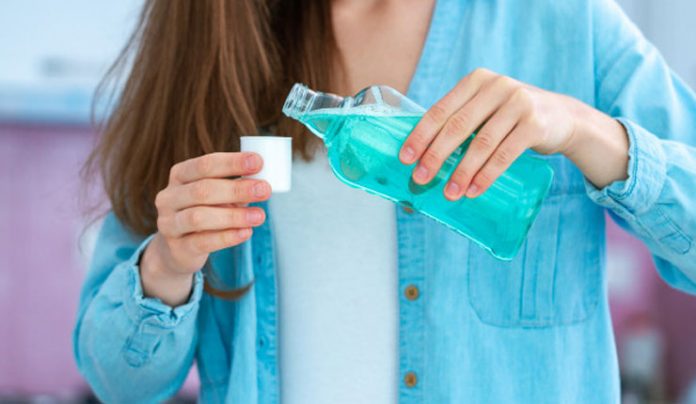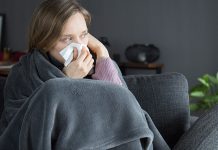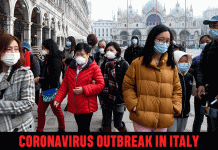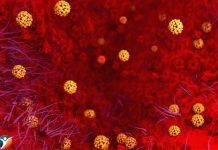
Can using a mouthwash reduce the risk of COVID transmission? The study being undertaken by scientists around the world have found that Sars-Cov-2 viruses may be inactivated using certain commercially available mouthwashes.
The entire world is facing the threat of Novel Coronavirus and millions of people have been affected and died due to this deadly virus. There is no vaccine available that can help in slowing down this infection. The only thing we can do is to prevent the spread of infections by strictly following the guidelines like wearing face masks, face shields, washing hands regularly, maintaining social distancing and taking immunity-boosting food.
Now, a new study has found that readily available dental mouthwashes have the potential to destroy the lipid envelope of coronaviruses, combating virus replication in the mouth and throat. Thus mouthwashes could be the key to lowering the spread of the deadly coronavirus infection, according to scientists.
A study published in the Journal of Infectious Diseases makes a case for commonly used mouthwashes in fighting COVID-19. According to the latest findings, gargling with mouthwash solutions may help ‘inactive’ the viral load of the SARS-COV-2 virus persisting in the mouth and throat and thereby, help lessen the spread of the infection.
The study, however, made it clear that using mouthwashes is no guaranteed treatment for the viral outbreak or protecting one from the infection; what it can possibly do is lower the chances of spread and transmission.
Researchers have based their evidence of using oral disinfecting solutions after it was demonstrated in cell culture experiments by virologists from Ruhr-Universität Bochum together with colleagues from Jena, Ulm, Duisburg-Essen, Nuremberg and Bremen. High viral loads can be detected in the oral cavity and throat of some Covid-19. It is also possible that the oral and throat cavities act as the ideal environments for the virus to settle in healthy individuals post-infection. Since the spread of respiratory droplets, coughing, sneezing or talking are the likely causes of spread, a gargling solution like mouthwash could reduce the risk of transmission and subsequently lower the viral load or even stop it from multiplying.
For the study, scientists tested out eight different store-bought bottles of mouthwash made out of different ingredients A quantity of mouthwash under testing was mixed with the virus and a biomolecular particle to recreate the effect of saliva. The solution was mixed together for 30 seconds to simulate gargling and see whether the solution was able to inactivate the viral load. Scientists tested the solution in Vero E6 cells, which, according to the researchers, are “particularly receptive” to SARS-CoV-2, to determine the quantities of the virus particles.
After the time gap, it was observed that while all of the mouthwashes were able to reduce the viral load, 3 out of 8 samples were able to root out the viral cells by a greater extent.
Researchers believe that if found to be effective, mouthwashes could act as a standard protocol in dental procedures and further reduce the risk of transmission.
The experimental study has only been done in a clinical environment and much more research is needed to conclude the working and efficacy of the same. Toni Meister, the co-author of the study, issued the word of warning about the experiment. “Gargling with mouth wash cannot inhibit the production of viruses in the cells, but could reduce the viral load in the short term where the greatest potential for infection comes from, namely in the oral cavity and throat”.
Certain studies have shown that nasal and oral rinses effectively shut down human coronavirus particles in less than two minutes. Researchers at Penn State College of Medicine said that the same mechanism should also kill SARS-CoV-2, the virus that causes COVID-19. In this study, scientists used common, over-the-counter products like diluted baby shampoo, peroxide mouth cleansers, and mouthwash to see how they could reduce the viral load in a patient’s mouth. The result was that most of the product tests did kill the virus particles within minutes.
The study led by Craig Myers, Ph.D., distinguished professor of microbiology and immunology at Penn State College of Medicine said that, “While we wait for a vaccine to be developed, methods to reduce transmission are needed.The products we tested are readily available and often already part of people’s daily routines.”
Nasal and oral cavities are the major points of entry for human coronaviruses, so Myers and his colleagues replicated the interaction of the virus in these areas. The virus used in this test had the same outer layer as SARS-CoV-2 and was deactivated by-products like baby shampoo and mouthwash in two minutes. Myers said that the next step is to evaluate whether these products can help reduce the viral load in patients who have tested positive for COVID-19.
According to Forbes, other researchers have also found that mouthwash is an effective and inexpensive tool to fight the coronavirus. Scientists at the University Hospital of South Wales found that many inexpensive mouthwashes can destroy the fatty membrane that surrounds SARS-CoV-2. Dr. Valerie O’Donnell, one of the Welsh researchers, stressed the need for urgent clinical trials to test the effectiveness of mouthwashes and nasal sprays against COVID-19
Forbes reported that a German study found that Listerine, Iso-Betadine, and Dequonal mouthwashes to be the most effective combatting three strains of SARS-CoV-2.
It may be noted that gargling with saline solutions, rinsing the mouth with salty or warm water are also claimed to root out COVID-19. However, there is no real proof that they work, and hence, shouldn’t be relied on. Medical advice and non-pharmaceutical measures such as social distancing, wearing masks and sanitization are the only measures which actually work currently without any available vaccine for the virus.








